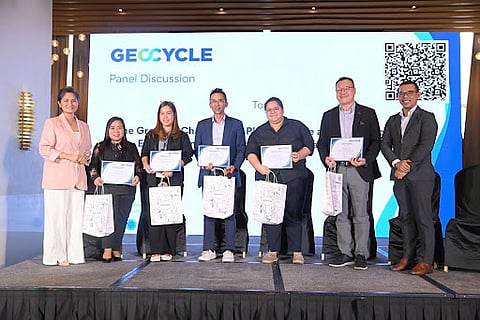
- NEWS
- the EDIT
- COMMENTARY
- BUSINESS
- LIFE
- SHOW
- ACTION
- GLOBAL GOALS
- SNAPS
- DYARYO TIRADA
- MORE

Holcim and Geocycle, in partnership with Circular Explorer, marked Zero Waste Month by hosting a forum that gathered government officials, private sector leaders, environmental scientists, and NGOs to explore innovative zero-waste strategies and foster cross-sector collaboration.
Under the theme "Pioneering Circularity: Advancing Zero-Waste for a Sustainable Future," the event emphasized building a circular economy while addressing the pressing challenges of plastic waste and microplastics.
The forum featured two educational sessions. The first tackled plastic waste management and the Extended Producer Responsibility (EPR) law, highlighting its role in improving waste recovery efforts.
“The success of the EPR law relies on active collaboration across sectors,” said Atty. Ivy Joyce de Pedro of the Department of Environment and Natural Resources (DENR). She stressed the need for government, private sector, and community partnerships to address infrastructure and data gaps, ensuring a more inclusive and resilient waste management system.
The second session focused on the threat of microplastics to marine ecosystems.
“The success of the EPR law relies on active collaboration across sectors,” says Atty. Ivy Joyce de Pedro of the Department of Environment and Natural Resources (DENR). In addition, she emphasizes the critical role collaboration plays among the government, private sector, civil society and communities. National and local efforts must align to address the infrastructure and data gaps. Partnerships between corporations and the informal sector can enhance waste recovery efforts and participating in these initiatives can build towards a more inclusive and resilient waste management system.
The second session delved into the dangers of microplastics in marine ecosystems.
“We only have one planet, but are living like we have two. The level of consumption, population growth and the need to develop is surpassing the ability of our environment to replenish our resources,” says Christine S. Bellen, Project Manager of Circular Explorer. To combat this, she emphasized the importance of a circular global economy to fulfill people’s needs while reducing the materials we extract from the earth. “The concept of circularity relies on resource management.”
The event concluded with the launch of Geocycle’s refreshed brand identity, reinforcing its commitment to sustainability in alignment with Holcim’s circular economy advocacy.
This strategic shift reflects evolving market demands and strengthens Geocycle’s leadership in sustainable waste management. By driving innovation, fostering partnerships, and deepening its commitment to circularity, Geocycle aims to minimize environmental impact and deliver long-term value to businesses and communities.
